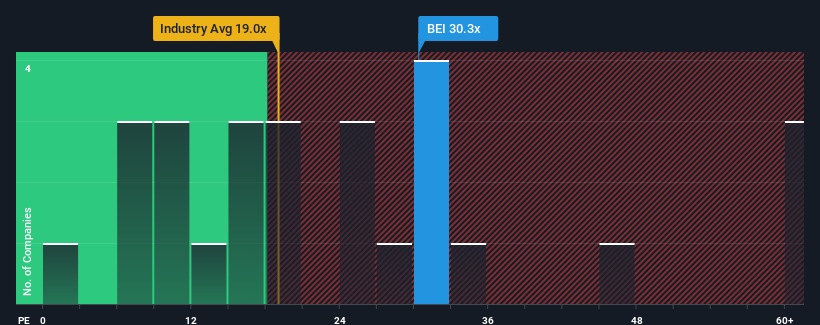- Germany
- /
- Personal Products
- /
- XTRA:BEI
Beiersdorf Aktiengesellschaft's (ETR:BEI) Share Price Not Quite Adding Up

Beiersdorf Aktiengesellschaft's (ETR:BEI) price-to-earnings (or "P/E") ratio of 30.3x might make it look like a strong sell right now compared to the market in Germany, where around half of the companies have P/E ratios below 18x and even P/E's below 11x are quite common. Although, it's not wise to just take the P/E at face value as there may be an explanation why it's so lofty.
Beiersdorf certainly has been doing a good job lately as it's been growing earnings more than most other companies. The P/E is probably high because investors think this strong earnings performance will continue. You'd really hope so, otherwise you're paying a pretty hefty price for no particular reason.
View our latest analysis for Beiersdorf

Is There Enough Growth For Beiersdorf?
In order to justify its P/E ratio, Beiersdorf would need to produce outstanding growth well in excess of the market.
If we review the last year of earnings growth, the company posted a terrific increase of 25%. Pleasingly, EPS has also lifted 45% in aggregate from three years ago, thanks to the last 12 months of growth. Accordingly, shareholders would have probably welcomed those medium-term rates of earnings growth.
Shifting to the future, estimates from the analysts covering the company suggest earnings should grow by 11% per year over the next three years. That's shaping up to be materially lower than the 15% each year growth forecast for the broader market.
In light of this, it's alarming that Beiersdorf's P/E sits above the majority of other companies. Apparently many investors in the company are way more bullish than analysts indicate and aren't willing to let go of their stock at any price. There's a good chance these shareholders are setting themselves up for future disappointment if the P/E falls to levels more in line with the growth outlook.
What We Can Learn From Beiersdorf's P/E?
Using the price-to-earnings ratio alone to determine if you should sell your stock isn't sensible, however it can be a practical guide to the company's future prospects.
We've established that Beiersdorf currently trades on a much higher than expected P/E since its forecast growth is lower than the wider market. When we see a weak earnings outlook with slower than market growth, we suspect the share price is at risk of declining, sending the high P/E lower. Unless these conditions improve markedly, it's very challenging to accept these prices as being reasonable.
The company's balance sheet is another key area for risk analysis. Our free balance sheet analysis for Beiersdorf with six simple checks will allow you to discover any risks that could be an issue.
Of course, you might also be able to find a better stock than Beiersdorf. So you may wish to see this free collection of other companies that have reasonable P/E ratios and have grown earnings strongly.
Valuation is complex, but we're here to simplify it.
Discover if Beiersdorf might be undervalued or overvalued with our detailed analysis, featuring fair value estimates, potential risks, dividends, insider trades, and its financial condition.
Access Free AnalysisHave feedback on this article? Concerned about the content? Get in touch with us directly. Alternatively, email editorial-team (at) simplywallst.com.
This article by Simply Wall St is general in nature. We provide commentary based on historical data and analyst forecasts only using an unbiased methodology and our articles are not intended to be financial advice. It does not constitute a recommendation to buy or sell any stock, and does not take account of your objectives, or your financial situation. We aim to bring you long-term focused analysis driven by fundamental data. Note that our analysis may not factor in the latest price-sensitive company announcements or qualitative material. Simply Wall St has no position in any stocks mentioned.
About XTRA:BEI
Beiersdorf
Manufactures and distributes consumer goods in Europe, the United States, Africa, Asia, and Australia.
Flawless balance sheet with solid track record and pays a dividend.
Similar Companies
Market Insights
Community Narratives



